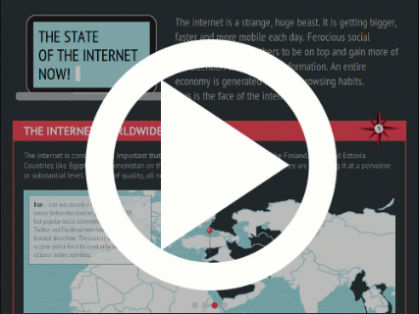Wednesday, 10 February 2010
Top ten tools for small businesses
Following a talk I gave at Cheltenham Connect on Tuesday 9 February, the slide deck is now available on the right. The tools have made the top ten as they are free and easy to use and help businesses save time. All bar one of the tools are hosted online so can be accessed from any internet connection.
For help on how to use any of the tools please get in touch.
For help on how to use any of the tools please get in touch.
Tuesday, 2 February 2010
Give productivity and sales a boost with enterprise social media
The biggest complaint from employees about intranets and other information storage areas like file shares, is poor quality search and navigation. They struggle to find what they are looking for. Enterprise social media can help the flow of information around a company and keep employees up to speed with best practice and company news. Better informed and more knowledgeable employees work smarter and generate more revenue.
For example, a sales consultant who can quickly find relevant case studies and has easy access to subject matter experts on his proposition can have a real edge. In organisations where employees recreate the wheel and such collateral is repeatedly produced from scratch, even more time can be saved. Good search technology, feeds and social bookmarking/tagging can all make appropriate information accessible.
Tools like Yammer enable efficient communication and collaboration amongst team and project members. This saves time and enable projects to be completed faster which aids productivity. For example, if a new product or service can be developed faster, then the time it takes to get to market is reduced and more can be sold.
Social media tools hosted on the web can help the business continue to operate when internally hosted systems are unavailable. For example, during the ‘big freeze' in the UK in January 2010, tools like instant messaging and webinars enabled communications to continue while email was less useful.
Within most companies email is the principal form of communication but email is not as 'light' as some social media tools and can be slow. Furthermore, useful information is hidden away in individual email accounts. Enterprise social media tools enable faster and more efficient communication. For example, instant messaging allows for rapid answering of questions by the IT Help Desk. The open nature of social media helps foster an increased awareness of what activities are going on both locally on projects and across teams. Due to this increased awareness less questions have to be asked as knowledge is acquired on an ongoing basis.
Many companies have an employee directory but this information is often maintained by the IT department. It’s more efficient for employees to edit and keep their personal details up to date and this approach allows them to add additional useful information.
For example, social media style profiles enable employees to list their areas of expertise so they can be easily located by others throughout the company and not just their immediate colleagues and team members. People can be grouped together in lists according to their areas of expertise thus forming a searchable database of subject matter experts. Employees can gain information from experts quickly and easily and this helps them do their job more productively.
Furthermore, the personal data from a profile can used to pre-populate online forms to save employees time when they use online self service systems. So employees don't have to continually fill out their personal details when for example; claiming expenses, buying software and viewing payslips. This results in a more efficient process and removes a repeated chore for employees.
Feed readers can be an efficient alternative to email subscription lists. Expertise from outside the business can be obtained as it's released. Feeds are easy to maintain and content is obtained quickly. Feeds can also be used to subscribe to an employee’s interests within the organisation. A significant issue with email is that many of the messages received are not directly relevant to the recipient and feeds help alleviate this issue of 'internal spam'.
With the right implementation, enterprise social media can make a real improvement to productivity and sales.
For example, a sales consultant who can quickly find relevant case studies and has easy access to subject matter experts on his proposition can have a real edge. In organisations where employees recreate the wheel and such collateral is repeatedly produced from scratch, even more time can be saved. Good search technology, feeds and social bookmarking/tagging can all make appropriate information accessible.
Tools like Yammer enable efficient communication and collaboration amongst team and project members. This saves time and enable projects to be completed faster which aids productivity. For example, if a new product or service can be developed faster, then the time it takes to get to market is reduced and more can be sold.
Social media tools hosted on the web can help the business continue to operate when internally hosted systems are unavailable. For example, during the ‘big freeze' in the UK in January 2010, tools like instant messaging and webinars enabled communications to continue while email was less useful.
Within most companies email is the principal form of communication but email is not as 'light' as some social media tools and can be slow. Furthermore, useful information is hidden away in individual email accounts. Enterprise social media tools enable faster and more efficient communication. For example, instant messaging allows for rapid answering of questions by the IT Help Desk. The open nature of social media helps foster an increased awareness of what activities are going on both locally on projects and across teams. Due to this increased awareness less questions have to be asked as knowledge is acquired on an ongoing basis.
Many companies have an employee directory but this information is often maintained by the IT department. It’s more efficient for employees to edit and keep their personal details up to date and this approach allows them to add additional useful information.
For example, social media style profiles enable employees to list their areas of expertise so they can be easily located by others throughout the company and not just their immediate colleagues and team members. People can be grouped together in lists according to their areas of expertise thus forming a searchable database of subject matter experts. Employees can gain information from experts quickly and easily and this helps them do their job more productively.
Furthermore, the personal data from a profile can used to pre-populate online forms to save employees time when they use online self service systems. So employees don't have to continually fill out their personal details when for example; claiming expenses, buying software and viewing payslips. This results in a more efficient process and removes a repeated chore for employees.
Feed readers can be an efficient alternative to email subscription lists. Expertise from outside the business can be obtained as it's released. Feeds are easy to maintain and content is obtained quickly. Feeds can also be used to subscribe to an employee’s interests within the organisation. A significant issue with email is that many of the messages received are not directly relevant to the recipient and feeds help alleviate this issue of 'internal spam'.
With the right implementation, enterprise social media can make a real improvement to productivity and sales.
Subscribe to:
Posts (Atom)









